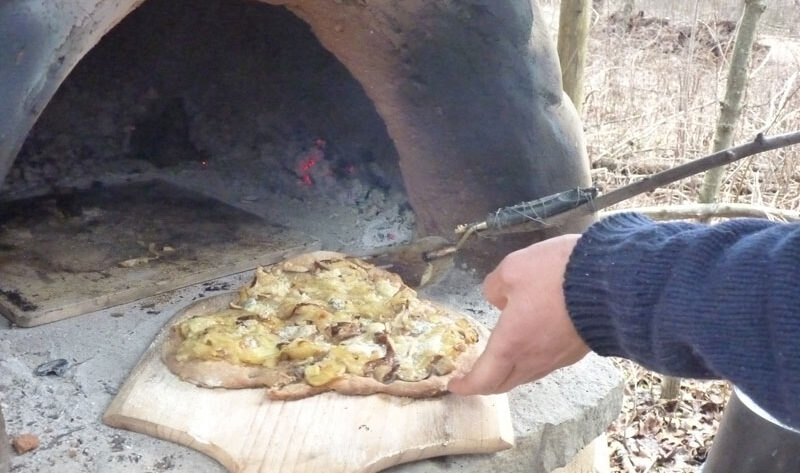One of my favorite authors, Wendell Berry, has a great deal to say about the rise of the modern “specialist” in his Unsettling of America: Culture and Agriculture. (This book, by the way, is one of the most influential books on my thinking and action and is well worth the read). Berry argues that specialization is part of what has made the shift in our food system from a broad network small family farms to centralized agribusiness and has precipitated some of the cultural challenges we face. Specialists, he argues, don’t do much of anything other than their specialty (so bankers can only bank, hair stylists only style hair, tax preparers only prepare taxes). He argues that as we become more specialized, we depend on specialists for everything outside of our specialty: food specialists raise our food, health specialists keep us healthy, mental health specialists keep us sane, housing specialists build our homes, lawn care specialists tend our lawns, and so on and so forth. So, more broadly, specialization has created a society where we literally depend on someone else for everything and fail to take care of or even attempt to address our own needs. And this is the situation in which we find ourselves today. Berry argues that generalization allows us to be more sufficient, think in a broader manner, and develop better relationships in our communities and with our land.

I think there is a great deal of truth in what Berry says, and I’d like to take Berry’s original concepts and complicate them a bit. That is, I’d like to argue that while we can certainly be specialists and some specialization is needed, to build sustainable and stable communities we need to balance specialization with generalist thinking and be able to work in multiple modalities. Focusing on working in multiple modes and embracing this generalist mindset allows us a great deal more independence and resiliency, which is part of the core shifts towards sustainability in thought and in action. To demonstrate this balance, I’ll use myself as an example of someone who is both a specialist and a generalist. I’ll also tie these modes of thinking and action to sustainability and permaculture design.
The Super-Specialized Specialist. I am a highly trained specialist in my profession (I am a university writing and rhetoric professor), and so I can speak direct experience and clarity about the specialization, how one becomes specialized, benefits, and drawbacks. From the ages of 18-28, I completed 10 years of higher education (including completing my B.A, M.A., and Ph.D.). For the first four years, I studied my specialty but also was exposed to a general education curriculum (which was a very good thing!) When I went to graduate school, I was trained only in my specialty. I breathed, ate and slept my specialty in the order of 80-100 hours a week to graduate and join my profession. And truthfully, I really enjoyed the immersive study of it, the focus, the determination, and dedication it took to see it through. Since that time, in order to get tenure at my university (which I just earned about 3 months ago), I again engaged in my specialty extensively through teaching, research, and service. This means for my entire adult life (I’m now 33), in every working hour, I have lived my specialty, and dedicated my life to my specialty. This is the nature of training to be a specialist, at least in higher education–you embody that specialty to the point where the specialty IS your identity. I even carry my specialty in my title and people address me as “doctor” rather than “Ms.” If I wasn’t so spiritually and physically dedicated to what I’m doing with the rest of my life with regards to sustainable and spiritual practice, I probably wouldn’t do a heck of a lot else.

Specialization certainly has its benefits–at least in the realm of higher education, specialization allows us to build knowledge by working intensively on a very small focused area, in conversation and collaboration with few others who are also working on that small area. This is one way of learning things that are of benefit to our culture and world–but by no means the only way in which we can learn. Some of the benefits of specialization are as follows:
1) Specialization helps build human knowledge, approaches, and understanding. There is a world out there full of things to know and things to respond to, but no one person can hope to understand all of it. Specialists, with their intensive training, can build knowledge in ways that non-specialists cannot (they also suffer from issues with regards to seeing things only from their specialization, but that’s covered below).
2) Specialization helps us accomplish complex tasks. If I want to put a solar water system in my house, I am going to learn a lot about how to do that–but I would love to talk to someone who has done it, a lot, and make sure I’m doing it right. If someone wants to write a grant or wants to learn about how to write more effectively, they talk to me.
3) Specialization can teach critical skills. I am grateful to my specialization for teaching me a variety of useful skills, such as how to write well, empirical research methods, how to engage in critical thinking, how to focus, and so on. The intensive nature of specialization training gives one tools that can be of great use in other areas (if one can see that training as use beyond the specialty). Even on this blog, you get some hints of my specialization in posts like this, this, or this.
In sum, there certainly is a place for specialty in our world. But at the same time, specialization has its serious downfalls and problems. Here are some of the problems of specialization as I’ve experienced them:
1) First, my perspective is mainly one of my discipline, which asks particular kinds of questions and uses particular kinds of methods in order to enact understanding (Thomas Kuhn had a great deal to say about this in his Structure of Scientific Revolutions.) Working in a highly specialized field can encourage a myopic view of the world. I have found this to be the case with many specialists (and not just those who work in higher education). For example, a neurologist sees all problems stemming from the brain, a dietician sees all issues related to diet, and so on. While a myopic view might not be as culturally problematic in a discipline like mine (where I spend a lot of time thinking about how written language is enacted in the world) a specialization in making money leads to only thinking about making money and making decisions where the most money is made at the expense of all else. And that, my friends, is part of what has led us to where we now find ourselves as a culture.
2) Second, while I came out of my training exceedingly good at my specialty, it was literally all that I knew how to do when I left. Part of this is that intensive training is the only way to be a specialist, but part of this was that intensive training was all I had time to do. Again, this does not encourage a broad perspective nor, frankly, a balanced individual.
3) Third, the demands of specialization continue, even long after one’s formal education is complete. After finishing my training, I entered the profession and dedicated just as much time to being a member, learning how to be effective, making various contributions, and so on. I think many specialists find this to be true–a work week well and above 40 hours is demanded to participate in the specialty, which leads to less time for everything else, such as spiritual or sustainable practice.
4) While specialization provides a great deal of depth, it lacks any sense of breadth in most cases. I don’t think that many specialists would disagree with this, even if saying it aloud might make them uncomfortable.
5) A lot of specialties we have today have nothing to do with providing for basic human needs, tending the land, ensuring a rich cultural tradition, and so on. They are there only to make money, or their specializations have become so intertwined with money and corruption, any original intentions or benefits to society or the land are lost. I think this is a sad truth that we also have to face.

So now that I’ve examined some of the benefits and challenges of specialization, I’d like to turn to Berry’s second mode of thinking and action: the generalist.
Working in Multiple Modes: The Generalist
Wendell Berry argues that the opposite of the specialist is the generalist–the person who isn’t highly specialized, but rather, has a little bit of knowledge about a wide array of subjects. He argues that small family farmers, by design, have to be generalists-they have to know a bit about soil ecology, meterorology, genetics, marketing, geology, and much more. There are a lot of benefits to generalization: seeing and interacting with the world in a multiplicity of ways, being good at a number of things, being flexible and adaptable. Take a look around any farmer’s market–you can spot the family farms with their dozens of products. I visited one such market this past week while visiting Washington DC (for a specialist conference): there were specialists at the market, like the cheese maker or the bread baker. But many family farms had a large assortment of products: handcrafted jams, mustards, maple sugar, honey, vegetables, scones, baskets, and more. I have found that in doing homesteading, sustainable living, permaculture design, and so on, a generalist mindset is hugely beneficial. Now a small family farmer might respond and say, “But I’m a farming specialist”; I think the difference here is that to be an effective farmer, one doesn’t just have to know one field–farming is inherently interdisciplinary and requires a broad set of skills to be effective. This is especially true when one examines the difference between the kinds of work that takes place on a large industrial farm vs. a small family farm (which Berry would argue is the difference between specialization and generalization).


One way of thinking about generalization is the idea of working in multiple modalities. A “modality” is a particular way of working, sensing, and/or inhabiting the world–it derives from the word “mode.” The term derives from the latin modus, which is where we get the Latin term still used frequently today in a limited context: modus operandi, or a method or working. There are other ways of thinking about the multitude of ways that we can work in/sense/inhabit the world–we might think about lenses through which we see and experience things. The 20th-century rhetorician Kenneth Burke talked about this as a “terministic screen” – the screen, aided by language, is the screen through which we view reality. And I think that ways of seeing and ways of action are linked and, really, inseparable. If we see the world through an artist’s lens, we see everything as inspiration for painting or sculpture. A real estate agent will look at the value of the properties on that street; a chef might note the variety of restaurants, a construction worker the spaces in disrepair, and so on. Regardless of how you want to theoretically frame the idea of the modality or generalist way of being–it is a powerful thing to realize. One of the things I’ve been practicing is shifting my viewpoint often and integrating viewpoints: if I am standing on a city street, how do I see that street as an artist? as a writing professor? As a permaculturalist? As a druid? And then, I say, can I see it as all of those things at once?
This blog is a great example of a generalist approach in working to achieve sustainable and spiritual practice. It has a few larger categories under which I lump things: druidry, the practice of a nature-based spirituality and lifepath; sustainability, the emphasis on living in a way that preserves the land for all life; and permaculture, a design system that allows us to use resources more effectively and honor life. Everything that I write about or share here has something to do with one of those things, often all of them (even the above posts can’t disentangle one from another). The sub-categories of this blog are wide-ranging indeed–from raising chickens to fermentation, from magical tinctures to seasonal celebrations and rituals, from herbalism to natural dyes, papers and artwork. I also spend a good deal of time thinking about philosophical and political issues , ones that impact sustainable and spiritual practices. My coverage of any of these issues, say beekeeping, isn’t as thorough as other blogs or writers who have chosen to specialize (for example, my favorite bee blog is the Honey Bee Suite which is a specialized blog about beekeeping). But what I can say is that you’ll be able to learn a little bit about a wide range of things, and for the kind of lifestyle I’m striving for, that’s super useful.
Each day, I work to find a balance (there’s another druidic concept) between being a specialist and finding time for my spiritual path, to reskill and learn and enact various sustainable practices. I think many of us, even those working highly specialized jobs, can still find time to build more generalist understandings that can greatly benefit sustainable practices and our work in the world. I’ve found that my work as a specialist is enriched by learning to think like a generalist–and this too, is an added benefit.

Generalist Thinking and Multiple Modalities as a Response to Our Predicament
I’ll conclude with a bit of a broader note on the issues of specialization and generalization by addressing the broader picture. One of the things John Michael Greer says, and its worth noting here, is that humanity has gotten itself into a predicament. This predicament is concerning human use and abuse of the land and uncontrolled growth, which has led to climate change, peak oil, resource depletion, loss of resources, mass extinctions, and much more. Greer argues that this is not a problem in the traditional sense: problems have clear solutions and can be solved, predicaments do not. Responding to predicaments doesn’t make the predicament go away, responses just give us some means of dealing with our predicament. And like the complexity of the predicament we face, using multiple modalities and generalist thinking is going to give us a wider set of responses. I don’t think that anyone specialized field or area is going to solve the predicament but we can work to respond in many ways…and those responses can help ourselves, our communities, and our world.




Great critique, very thoughtful! This line here, second sentence under the Generalist subheading, I think maybe you mean to say ‘generalist’ rather than ‘specialist’?
“He argues that small family farmers, by design, have to be specialists–they have to know a bit about soil ecology, meterorology, genetics, marketing, geology, and much more.”
Yeah, I’ll go fix that :). Thanks for the comment!
congratulations on tenure. it is quite an accomplishment, and perhaps only for this time, but there is nothing like it. i enjoy your writing very much.
Thank you, Yvonne. It really is…something :P.